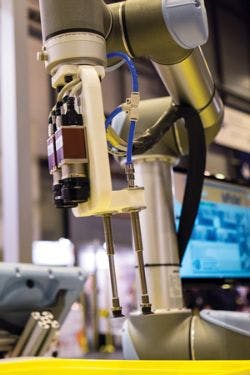International Federation of Robotics: Bill Gates’ idea of taxing robots is wrong
Bill Gates’ idea that robotsshould be taxed in order to help people keep their jobs aims to solve a problem that does not existing, according to the International Federation of Robotics.
Speaking on the idea of taxing robots, Gates stated: "Right now, the human worker who does, say, $50,000 worth of work in a factory, that income is taxed and you get income tax, social security tax, all those things. If a robot comes in to do the same thing, you’d think that we’d tax the robot at a similar level."
Empirical analysis of economic data and forecasts shows that automation and the use of robots actually helps to create new jobs by increasing productivity, according to the IFR. More than 90% of jobs will not be fully automatable in the future, according to the McKinsey Global Institute. Instead, notes the IFR, humans and robots will work together. In fact, the impact of robots on employment can already been see in the most advanced industrial nations, said the IFR.
In the US automotive industry, more than 60,000 industrial robots were installed between 2010 and 2015. During the same period, the number of employees in the US automotive sector increased by 230,000. These trends can be seen in parts of Europe and Asia, as well. So instead of taxing the robots, we should be taxing the profits, according to Joe Gemma, IFR President.
"Research shows that automation actually results in a positive tax balance for social systems," the IFR wrote in a press release. "Repetitive or dangerous tasks are replaced by industrial robots, leading to the creation of new, safer, higher-skilled and higher-income jobs that increase pension contributions."
In addition, the IFR supports the idea of greater cooperation in robotics between the public and private sectors, suggesting that the two adapt education and training systems so that current and future workers can reap the benefits of robotics. Furthermore, the IFR notes that it is important to avoid unnecessary bureaucracy, noting that they believe that a European agency for robotics and artificial intelligence would create bureaucratic overhead, while stressing the importance of using international standards for robots.
View the IFR press release.
Share your vision-related news by contacting James Carroll, Senior Web Editor, Vision Systems Design
To receive news like this in your inbox, click here.
Join our LinkedIn group | Like us on Facebook | Follow us on Twitter
Learn more: search the Vision Systems Design Buyer's Guide for companies, new products, press releases, and videos
About the Author

James Carroll
Former VSD Editor James Carroll joined the team 2013. Carroll covered machine vision and imaging from numerous angles, including application stories, industry news, market updates, and new products. In addition to writing and editing articles, Carroll managed the Innovators Awards program and webcasts.
